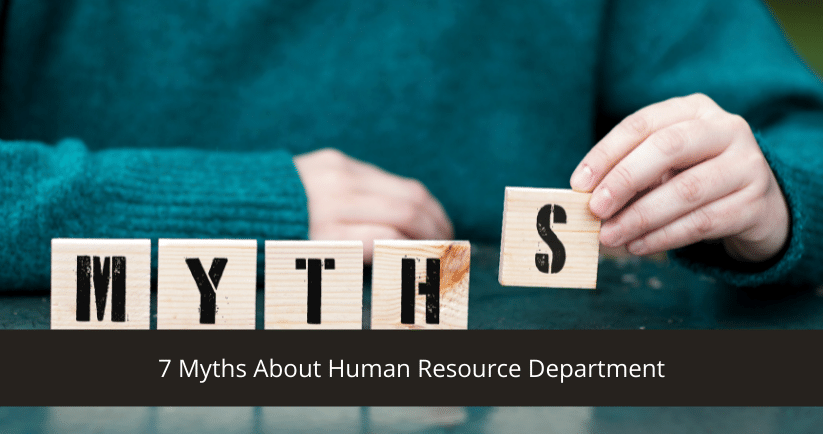When it comes to the human resources department in a company, there are various misconceptions about their roles and responsibilities as well as several funny myths about HR. Being in the HRMS domain, we work with HR all the time. After all, we are the ones developing the HRMS to improve their workflow and overall efficiency.
Over time, we have become aware of the various common myths about the HR department and its responsibilities. Hence, this article is an effort to demystify 7 of the most common myths about human resource department.
Let us take a deeper dive to explore the myths…
1. HR works alone
HR NEVER works alone. While some HR tasks require some form of confidentiality to maintain the employee and company interests, they rarely work alone. It is easy to conclude that they work alone from their classified work nature.
The reality is that HRs are often required to coordinate with other departments as well as the upper management. For example, if an employee has an issue with their salary, they need to consult the accounts department to get it resolved on time. Similarly, they sit with the C-suite while drafting new policies to ensure that statutory compliance is maintained while its inception.
Additionally, the HR department needs to coordinate with multiple other sections of the company whenever there is an addition of a new department or expansion of the company. All of these facts point to the truth that HR seldom works alone. While it is easy to infer that they work alone due to their secretive nature, working with other sections is a part of their daily duties.
2. HR is a complaint box
Let us get the most common myth out of the way: HR is not a complaint box! This myth seems to have originated from the poor experience employee might have had with yesteryear’s HR practice.
Most of the employees used to contact their HR only when there was some issue. Despite the best efforts from the HR’s end, these issues used to take weeks or even months to resolve, depending on its gravity. By this time, the employees would have already presumed that HR simply gave them futile assurances instead of resolving their issues.
However, let us take a look at these issues from HR’s perspective. Even smaller issues require much attention and need to be investigated thoroughly. If left unchecked, these smaller issues could lead to larger issues that might come back at a later date to haunt HR again. Additionally, they are required to document every issue and its resolution for future reference.
They are also required to coordinate with various departments to get these issues resolved. All of these tasks require time which the employees wouldn’t be concerned with. This has led to the proliferation of the ‘complaint box’ myth.
3. HR protects company interests only
We must admit that there is some truth to this myth. While HR surely aims to protect the interests of the company, it also aims to protect the employee interests equally. In fact, HRs are the one who acts as mediators in cases both the employee and the employer’s interests are conflicted.
HR works to protect the employees’ interests by helping them resolve issues related to racial discrimination, gender inequality, bullying, sexual harassment, etc. to name a few. They are the ones who ensure that the staff members, as well as the organization, act ethically to avoid any conflict of interest.
Hence, we should avoid the mentality that HRs protect the company’s interests only. The HR department is responsible for maintaining and improving employee engagement and job satisfaction rates. Their duties also include ensuring that the employees stay content with their jobs to decrease attrition and turnover. Hence, they protect both the employees’ and the employer’s interests.
4. HR is bureaucratic
HR is Strategic in nature. Although the earlier HR was limited to limited administrative tasks, times have changed, and so has the HR. It has evolved to become a central aspect of many organizations as they manage one of the most valuable assets of any company: its employees.
Hence, HR has to be strategic in nature. In fact, their evolution has made them a part of the boardroom wherein, they are tasked with providing insights into their employees’ minds and strategizing policies to ensure that they stay productive and efficient.
Since HR is aware of the employee sentimentality towards their company, they can use this data to help the C-suite take strategically important decisions by providing relevant evidence and reports. They utilize these analytics to drive change throughout the company and ensure organizational success. The HRs are also an active part of the decision-making process. Their inputs are valuable as they can address various issues plaguing the company such as inefficient productivity, lack of motivation, disengagement, employee turnover, etc.
5. Every company’s HR department is the same
Since no two companies are exactly alike, so are their HR departments. In some companies, they may have a wider range of duties and responsibilities than others. Some companies might give them additional freedom in the way they conduct their duties, while in others, they might have to undertake their tasks within strict guidelines.
In some companies, there might be an abundance of HR specialists, while in others, there might be dedicated HR specialists for every HR task. The different functions undertaken by the HR department is aligned with the company’s vision. Hence, even though the overall duties might remain the same, there could be several differences in the way these tasks are undertaken.
For example, HR will be in charge of drafting the employee policies in every company. However, in some companies, they would be the ones implementing it throughout the organization, while in others, the policies would be reviewed by several departments before being implemented.
6. HR is a C-suite spokesperson
The HR and the C-suite are indeed closely related and hence, they do speak for the C-suite in some instances. However, that is not the case all the time. The HR’s primary responsibilities also include communicating change, and the changes are often decided by the upper management, often after lengthy discussions with the HR department.
HR is an active part of the decision-making process. They have a vital say in the boardroom meetings as they are the ones who have all the relevant facts about the employees. More often than not, they are the ones who would have all of the information related to the staff and their current mindset. They also have all the analytical reports to help the C-suite understand why they are opposing a certain reform or advising them to implement some other transformation.
In the modern HR domain, which is supported by AI-backed HRMS, it is becoming common practice to find the C-suite asking for the solutions from the HR rather than the other way round, which used to be the case earlier.
7. Only HR specialists can be promoted
As with any designation and department, HR promotions also depend on various factors and not simply whether an individual is a generalist or specialist. We also wish to add that there is a certain truth to this myth.
While certain specialists have a certain place in the senior level, HR generalists are in fact preferred for certain other senior positions. For example, specialists are preferred for senior positions for learning and development, employee relations, etc. as they are required to have the necessary technical expertise required for such roles. On the other hand, generalists are preferred for HR head, HR director, HR business partner and similar roles since it requires leadership and communication skills more than technical expertise.
Hence, it is simply a myth that only HR specialists can be promoted. HR generalist and HR specialist have their importance and HRs should not make the mistake of considering a specific career path based on this myth. Instead, HRs should follow their passion and undertake the roles that they are good at.
Demystifying HR
Since we have discussed 7 common myths about the human resource department, let us demystify them to conclude this article:
- The HR department cannot operate alone as it requires support from the upper management and coordination from other departments for smooth functioning.
- HR personnel do more than listen to complaints – they help support the most valuable asset of the company to achieve maximum productivity and efficiency.
- The HR department has to diligently protect the company’s interests while providing adequate support to the staff to ensure that all of their processes are ethical.
- HR managers are required to play a strategic role to drive company growth and meet the goals and vision of the company.
- Every HR department is unique as its structure, roles and responsibilities are dependent on the company vision.
- HR is involved with C-Suite to some extent, depending on the structure of their organization; however, this doesn’t mean they are a spokesperson for the upper management.
- HRs need to follow their passion and look for ways to remain supportive for their employees, to ensure career growth instead of following old myths.
To read more trending HR-related blogs, click here.








